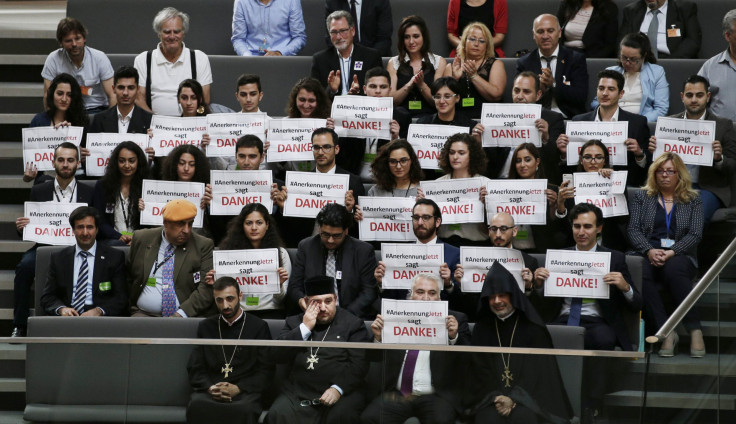German Parliament Votes To Recognize Armenian Genocide Despite Warnings From Turkey

The German parliament overwhelmingly approved a resolution Thursday to label the mass killing of Armenians by Ottoman Turks during World War I as genocide, despite the Turkish government warning that the vote would be regarded as “a real test of the friendship” between the two countries. Most historians now estimate that nearly 1.5 million Armenians were killed in 1915-1916, but Turkey has long contended that the figure has been massively exaggerated.
The resolution, which garnered the support of German Chancellor Angela Merkel’s Christian Democratic Union (CDU) and its coalition partners, calls for the “commemoration of the genocide of Armenian and other Christian minorities in the years 1915 and 1916.”
However, Merkel was not present for the vote.
“Without this admission there cannot be forgiveness and reconciliation. Suffering does not know temporary boundaries,” Albert Weiler, a member of the CDU, reportedly said. “Genocide will never remain in the past. By recognizing the genocide, it will force the Turkish government to take a brave step and look into its own history.”
The resolution also acknowledges “the German Reich’s complicity in the events” and the “inglorious role” it played. Germany was a close ally of the Ottoman Empire during World War I.
Over 20 nations, including France, Russia and Italy, and most historians across the globe already recognize the killings as genocide.
But Turkey proffers a different version of events, maintaining that those killed were victims of civil war and unrest.
“When the Russian army invaded eastern Anatolia, some volunteer Armenian units in Russia and the Ottoman Empire supported the invasion. ... War-time conditions, famine, epidemics, ongoing internal conflicts and local groups seeking to take revenge left a number of Armenians dead, although the Ottoman government had made careful plans for their safe transfer and tried to meet their humanitarian needs,” Turkey’s state-run Anadolu Agency stated in a recently published article. “Historical documents clearly show that the Ottoman government not only did not intend for these tragedies to take place, but also punished offenders who committed crimes against the relocated Armenians.”
On Wednesday, Turkish Prime Minister Binali Yıldırım went so far as to terming the killings an “ordinary” wartime event.
“It’s a ridiculous vote,” Yıldırım reportedly said. “[This] was one of many ordinary events that can happen in any country, in any society under the conditions of world war one. We know that those who want Turkey to pay the bill for it do not have good intentions.”
The passage of the resolution risks straining the already frayed ties between Turkey and the European Union, which is seeking Ankara’s help to stem the massive influx of refugees. A huge chunk of the refugees — most of whom fled war and persecution in Syria, Iraq and Afghanistan — have settled in Germany after entering Europe.
Under a deal stuck between the EU and Turkey earlier this year, Ankara is obligated to take back refugees arriving on Greek islands in return for monetary aid and promise of visa-free travel through most of Europe.
Many have expressed concerns that the vote may scupper the deal, even though German lawmakers explicitly stated that the Turkish government is not responsible for what happened 100 years ago.
In response to the German parliament’s decision, the country’s ruling AK Party on Thursday said that the vote had “seriously damaged” bilateral relations, and the government recalled its ambassador in Berlin.
© Copyright IBTimes 2025. All rights reserved.





















